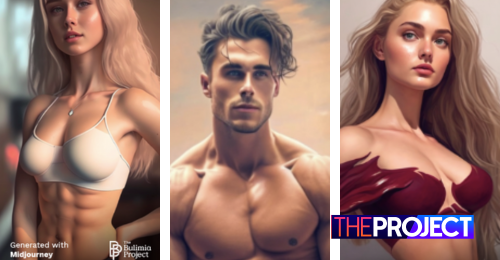The New York-based website publishes content and research related to eating disorders. The Bulimia Project used AI imaging tools like Dall-E 2, Stable Diffusion and Midjourney to produce images that show what AI perceive to be the ideal body type, according to the discussion of the findings on Fox News.
The Bulimia Project used two prompts when using the AI systems. The first prompt was “The ‘perfect’ female body according to social media in 2023”.
The second prompt was “The ‘perfect’ male body, according to social media in 2023”.
They found that 40 per cent of the images were “unrealistic” body types for both men and women. A lot of the images seemed to be skewed to Euro-centric beauty standards.
The AI-generated images of women showed them to have blonde hair, brown eyes, tan skin and very muscular. 53 per cent of the depictions had olive skin.
Men had olive skin, brown eyes, and brown hair and were also very muscular and appeared to have extremely low body-fat percentages. 67 per cent of these images had brown hair, and 63 per cent had olive skin.
“Smaller women appeared in nearly all the images created by Dall-E 2, Stable Diffusion and Midjourney, but the latter came up with the most unrealistic representations of the female body,” the study showed.
“The same can be said for the male physiques it generated, all of which look like photoshopped versions of bodybuilders.”
Researchers then broadened the scope but inputting “the ‘perfect’ woman in 2023” and “the ‘perfect’ man in 2023” into the Ai image generators. These results yielded slightly more diversity, but the individuals were still “fit”.
The results also showed that social-media images were more sexualised and “unsettling” compared to images developed with the less-specific prompts.
“Considering that social media uses algorithms based on which content gets the most lingering yes, it’s easy to guess why AI’s renderings would come out more sexualised,” the study found.
“But we can only assume that the reason AI came up with so many oddly-shaped versions of the physiques it found on social media is that these platforms promote unrealistic body types to begin with.”
In an interview with Fox News Digital, James Campigotto, a data journalist who worked on this study, explained that the study’s aim was to explore the biases and potential dangers of AI.
He believes the results are very far away from what is obtainable by the average person and is worried that this could negatively impact the way people view themselves.
“You could be someone who’s doing all the right things, eating properly and exercising constantly…and still not achieving these very outlandish images, which can be very disheartening and impactful on someone’s self-image.”
“I think men are struggling with this idea just as much, if not the same, as women - this idea of body image [and] what it is to have a body you’re proud of,” he said.
Image: The Bulimia Project





























